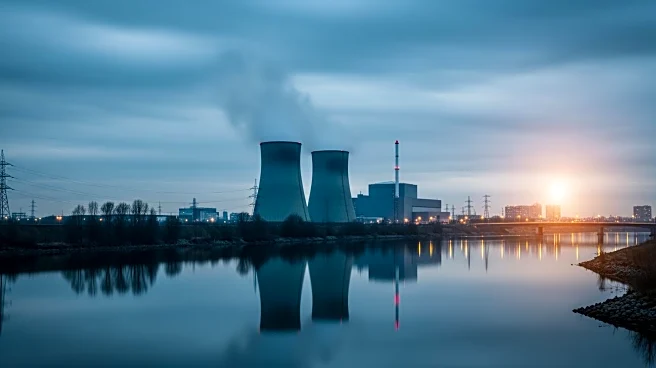What's Happening?
The United Kingdom has announced plans to build its first mini nuclear power station in North Wales, a decision that has caused concern in Washington. The U.S. had been advocating for its energy firm,
Westinghouse, to lead a large-scale nuclear project in Wylfa, Wales. However, the UK opted for a British-built Small Modular Reactor (SMR) instead. This decision was announced by UK Prime Minister Keir Starmer during his visit to North Wales, alongside Simon Bowen, Interim Chair for Great British Energy - Nuclear, UK Chancellor of the Exchequer Rachel Reeves, and First Minister of Wales Eluned Morgan. The move marks a significant step in the UK's energy strategy, focusing on domestic capabilities in nuclear energy development.
Why It's Important?
The UK's decision to proceed with a British-built SMR rather than involving the U.S. firm Westinghouse has implications for international energy partnerships and geopolitical relations. For the U.S., this decision represents a missed opportunity to expand its influence in the global nuclear energy market. It also highlights the UK's commitment to developing its own nuclear technology, which could affect future collaborations between the two countries. The development of nuclear power stations is crucial for energy security and reducing carbon emissions, making this decision significant for both environmental and economic reasons.
What's Next?
The construction of the nuclear power station in North Wales is expected to proceed, with potential impacts on local economies and energy policies. The U.S. may seek alternative avenues to collaborate with the UK on energy projects or reassess its strategy in promoting American firms in international markets. Additionally, the UK's focus on domestic nuclear technology could lead to further investments in research and development, potentially influencing global nuclear energy standards.
Beyond the Headlines
This development may also reflect broader trends in energy independence and technological sovereignty, as countries increasingly prioritize domestic solutions over international partnerships. The UK's decision could inspire other nations to invest in their own energy technologies, potentially reshaping the global energy landscape. Ethical considerations regarding nuclear energy, such as safety and environmental impact, will continue to be central to discussions as the project progresses.










